In this Rank Math review, we’ll introduce you to the plugin, explain how it works, and discuss installation and configuration. Then we’ll talk about its features and see how it better than Yoast SEO and other popular options. Let’s get to it!
Rank Math Introduction
How to Install and Configure Rank Math (In 3 Steps)
In this part, we’ll tell you the best way to use the Rank Math configuration wizard, and the additional settings you can change later you finish the plugin’s initial configuration. Let’s take a look at how to setup Rank Math in three easy steps:
Step 1: Through Rank Math Setup Wizard
When you initiate Rank Math, the plugin will incite you to use its configuration wizard. There are quite a few steps involved, so we’ll separate each one.
Connecting Your Account
Firstly, Rank Math requests that you to sign up for a free account on its platform. If you want to get access to the plugin’s complete set of tools, it’s a stage that you can’t skip

Once you connect your account, Rank Math will ask if you Easy and advanced mode with free version, we recommend choosing the Advanced Mode that get you full control over all SEO settings.
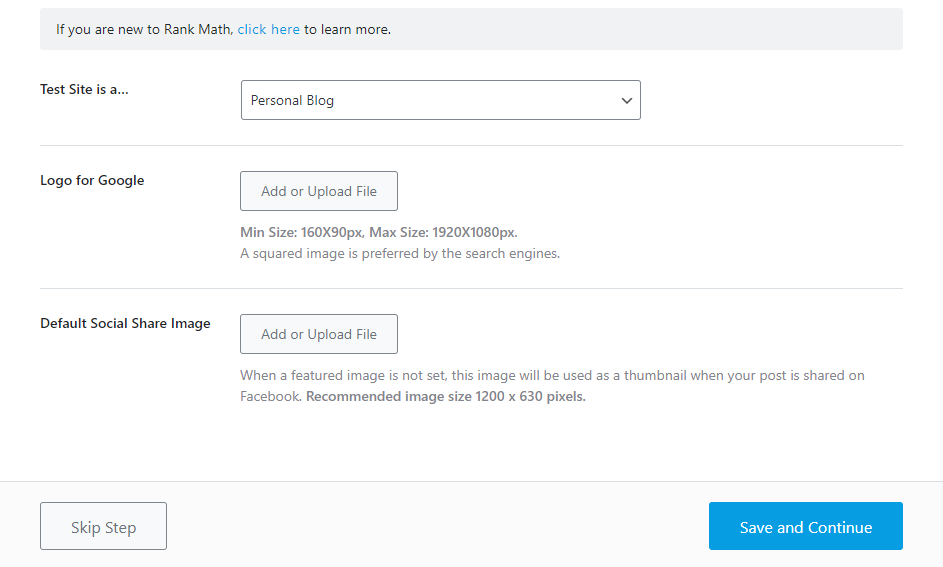
Connecting to Google Services
The next step, you’ll have the option to connect your website with Google Search Console and Google Analytics. If you’re not using both services yet, we recommend setting up accounts since they can give you priceless data.

When you select Connect Google Services, you’ll be requested authorization for Rank Math to get to access your account data. Click on Allow to finish this step of the process.
Creating a Sitemap
Now, we get to the Rank Math XML sitemap. Rank Math will ask you if you want the plugin to generate a sitemap for your website, whether to include images, and what content it should map:

If there are any custom post types that you’d rather not include as part of your website’s sitemap, you can exclude them here. However, the rest of the default settings should work perfectly for most sites.
Rank Math will guide you through a handful of final optimizations before returning you back to the dashboard. The plugin will enable you to ‘noindex’ categories and tags with no content, as well as decide if you want to add the ‘nofollow’ attribute to external links:

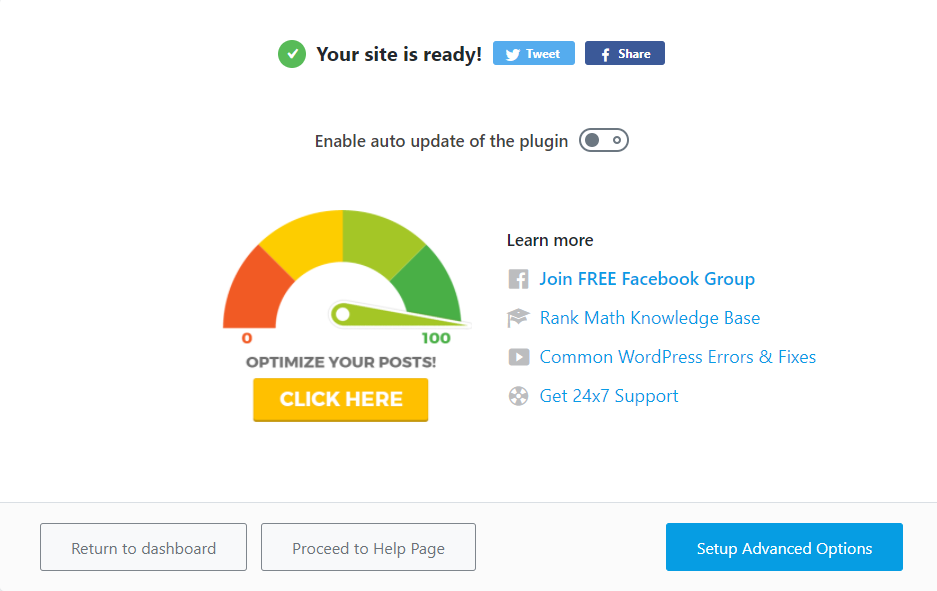
Now, you can get back to the dashboard if you need. Rank Math also includes couple of a few more advanced options inside the setup wizard.
Setting Up Advanced Options and Schema Markup
To access them, click on the Setup Advanced Options button. First, the plugin will allow you to decide which user roles should have full access to Rank Math configuration pages:
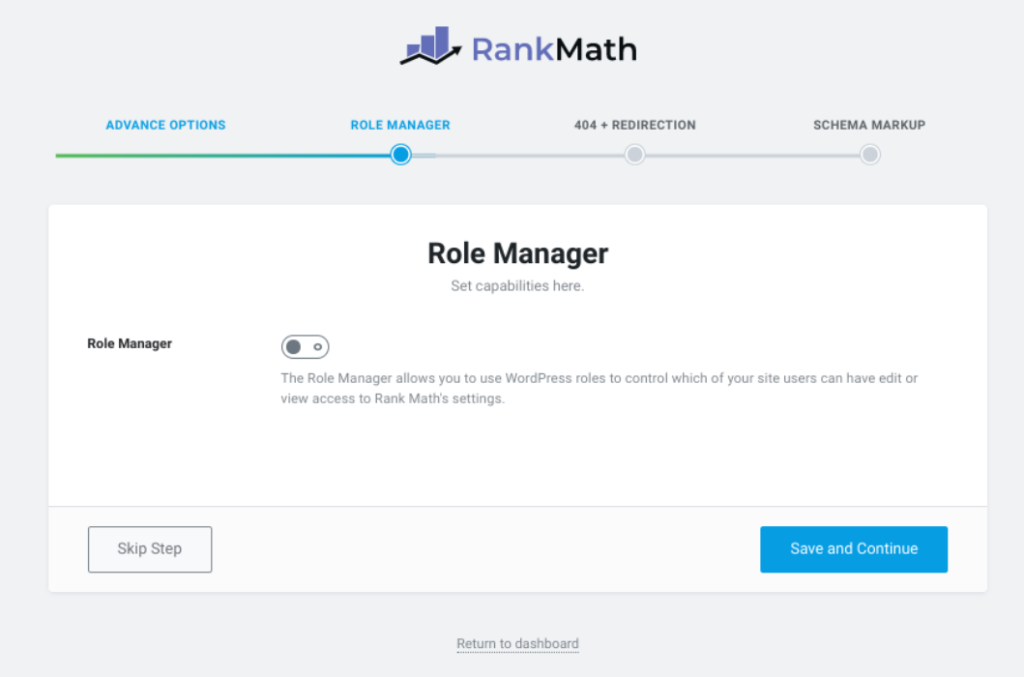
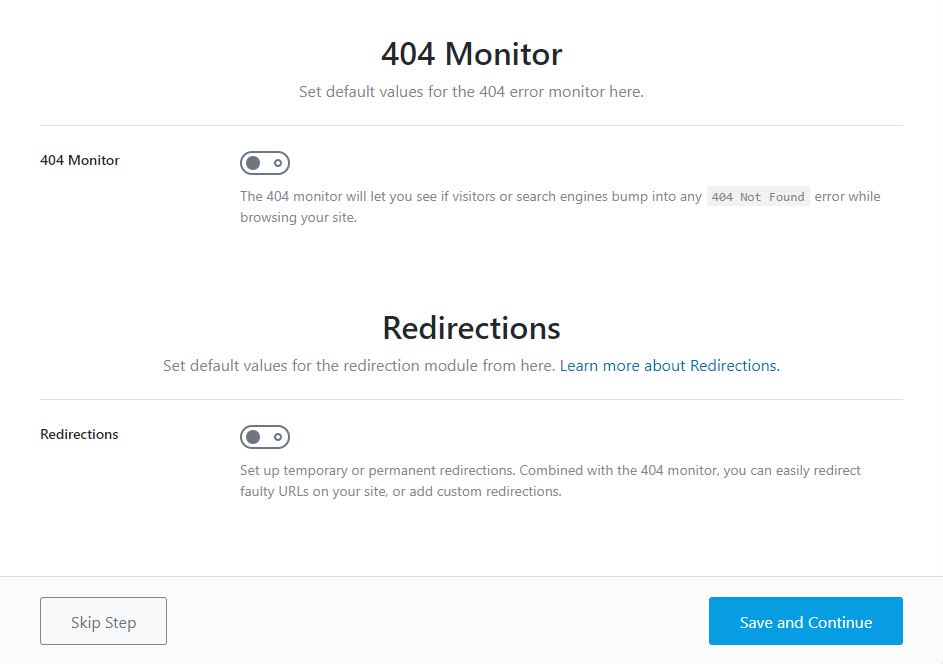
At last, Rank Math will ask you whether you want it to add schema markup to your content, which we recommend doing. Schema markup is powerful way to drive more traffic to your pages.
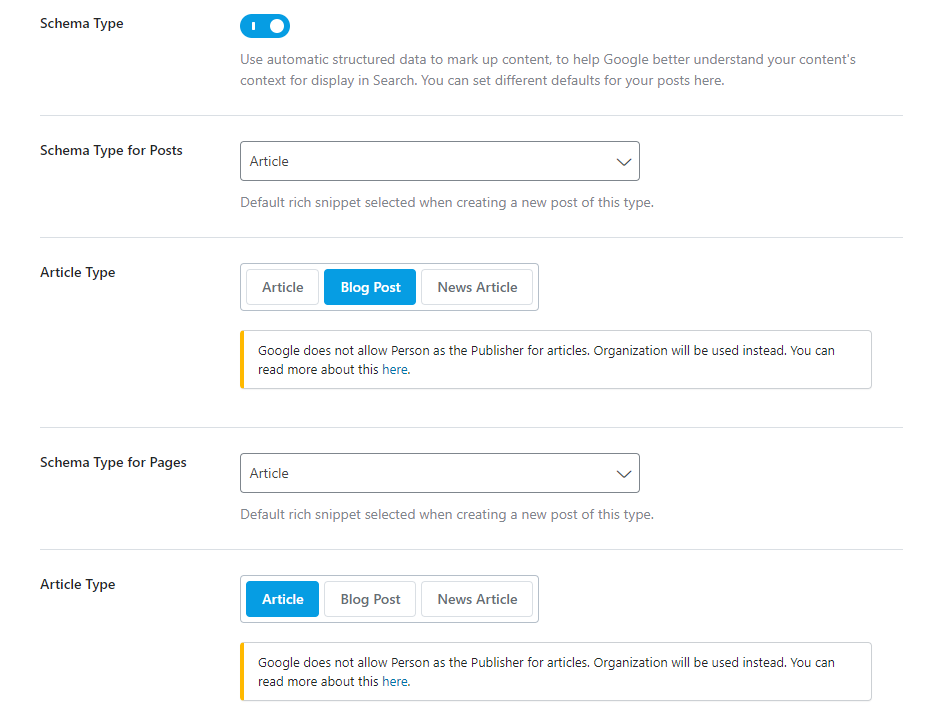
Step 2: Configure Individual Rank Math Modules
Rank Math uses a modular system that lets you choose which of its tools to turn on for your website. For example, you can decide whether to enable 404 error monitoring, support for Accelerated Mobile Pages (AMP), advanced options for image SEO, and more:

At this stage, we recommend checking out what each module does and deciding which options you want to enable for your website. For every module that you enable, you’ll get access to a new set of configuration options.
Each setting is easy to configure because Rank Math explains what it does. You don’t have to consult the plugin’s documentation at every turn. On top of each module’s settings, Rank Math will also set up a new tab where you can consult your Google Analytics data directly:
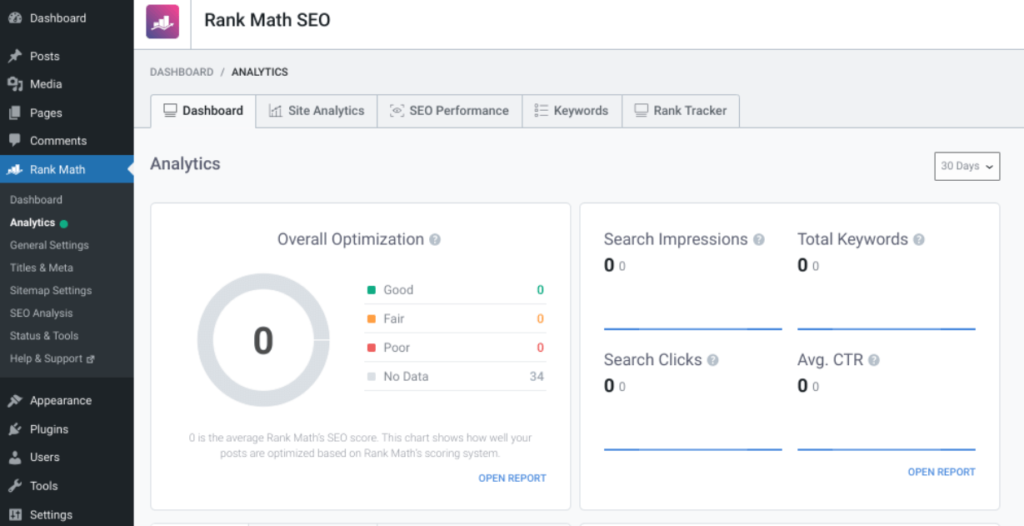
Step 3: Import Data from Other SEO Plugins
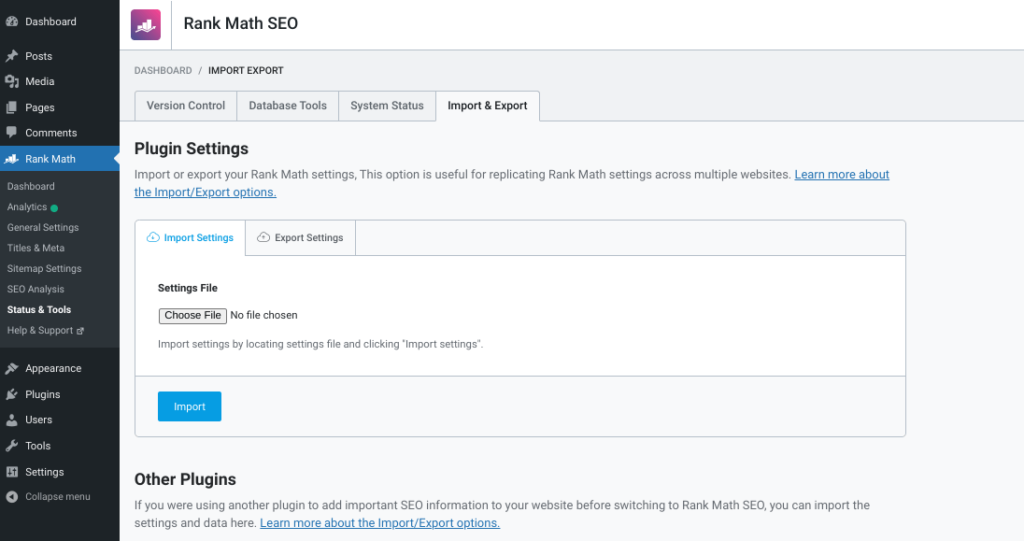
How to Use Rank Math for SEO 🔧
Now let’s see what the plugin offers when it comes to SEO. In the following sections, we’ll discuss how to use Rank Math for SEO, including:
- Running an SEO Analysis
- Understanding Your Rank Math Score
- Adding Rank Math Schema Markup
- Running an SEO Analysis
- Running an SEO Analysis
The first step after configuring Rank Math analysis using the plugin’s SEO analyzer feature. The analysis will provide you with an overview of basic SEO ranking issues, such as:
- Broken links
- Missing page titles
- Lack of tags
- Website performance issues
- And more
To get started, you can navigate to Rank Math > SEO Analysis and click on Start Site-Wide Analysis:

The test will run, and once it’s done, you’ll see a result score such as the following:

Understanding Your Rank Math Page Scores
If you’re using the Block Editor, you’ll see each page’s Rank Math score on the top menu, to the right side of the screen:

Adding Rank Math Schema Markup
The same Rank Math menu includes three other tabs. One for robots.txt configuration, another for adding schema markup to your content, and a final, social media preview section.
If you use the free version of the plugin, you can add a single schema for each page.

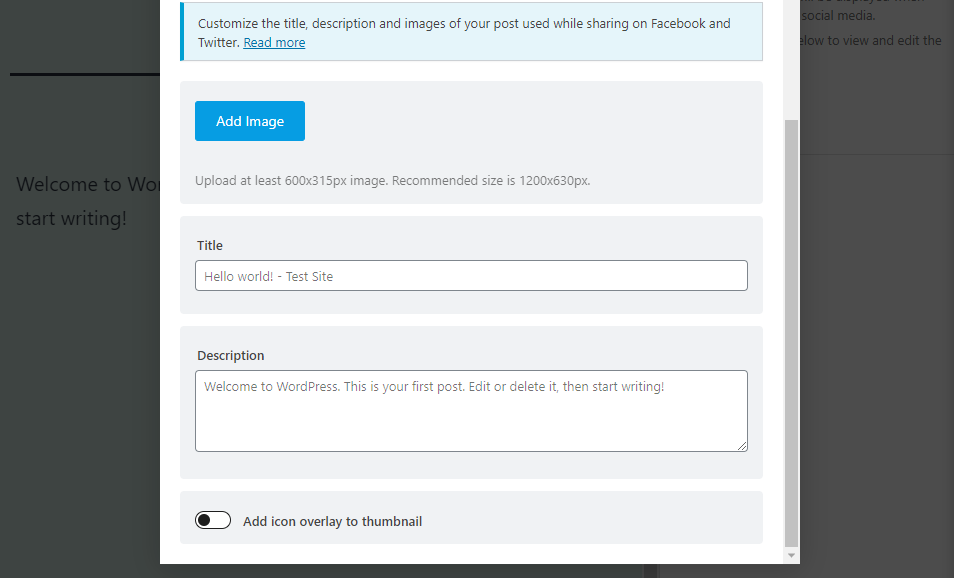
Finally, Rank Math empowers you to see how your content will look if you share it on social channels. Here, you can also replace the featured image for social networks, edit the content’s title, and modify its description:
Rank Math Review: Free vs Premium 💰
Rank Math’s free version is already one of the most comprehensive (if not the most) SEO plugin but when it comes to Rank Math premium worth considering paying for a premium license.
Some of the advantages that come with Rank Math premium include:
- A keyword rank tracker functionality
- Support for up to 500-1,000 tracked keywords (including rankings)
- More options for adding schema markup to your content
- Integration with Google Trends, News, and Video
- Tools for local SEO optimization
- Advanced options for WooCommerce SEO
Rank Math’s keyword tracker is surprisingly in-depth. It shows you impressions, clicks, and overall position. By tracking keyword rankings, you can see whether the changes you make impact the traffic you get from search engines.
Obviously, that feature alone justifies a Rank Math premium license. Pricing starts at $59 per year, which is pretty reasonable:




